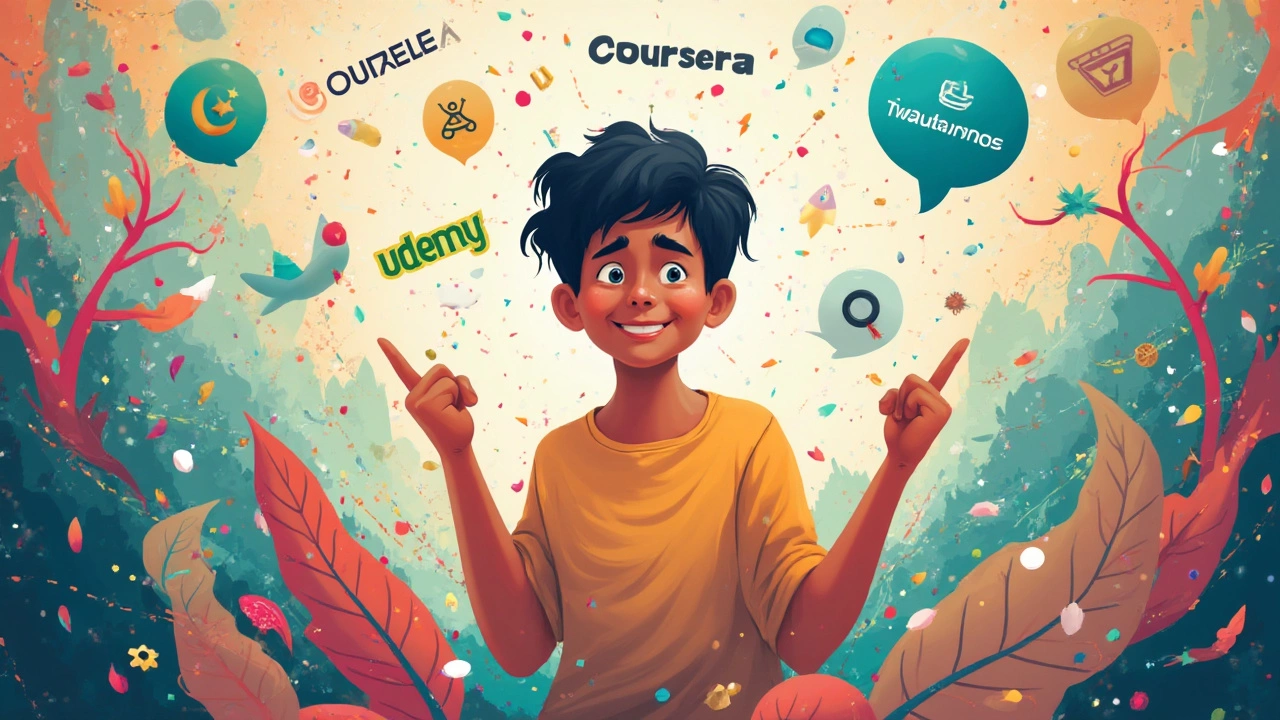Finding the best online course platform can feel like searching for a needle in a haystack. With so many options out there, where do you even start? The key is to understand what you need and what each platform offers. Let’s face it, everyone learns differently, and knowing your learning style can really help here.
Some platforms focus on professional skills with sleek, well-structured courses, while others offer a more relaxed approach, providing a range of topics from coding to cooking. Ever heard of Coursera? It's perfect for those seeking courses from top universities. Or maybe Udemy rings a bell? It's a popular choice for self-paced learners who love variety.
But wait, it’s not just about content. Flexible pricing plans, user-friendly interfaces, and interactive features like quizzes and forums should also influence your choice. Take Teachable, for example. It’s great for educators wanting to create their own courses. The hands-on experience can be super rewarding if you're into teaching.
- Understanding What Makes a Great Platform
- Top Platforms and Their Features
- How to Choose the Right Platform for You
- Future Trends in E-Learning Platforms
Understanding What Makes a Great Platform
When you're choosing an online course platform, it’s kinda like picking out the perfect dessert – there’s gotta be a little bit of everything you need. Let's break down the main ingredients that make a platform shine for both e-learning students and course creators.
Feature-Rich Offerings
First off, not all platforms are created equal. A solid platform should have diverse features like video lectures, downloadable resources, quizzes, and discussion boards. These aren't just bells and whistles; they enhance the learning experience. Consider platforms like Coursera or Udacity, known for their interactive content. If the platform supports certifications or has partnerships with big names in the industry, that's a huge plus!
Ease of Use
Nobody wants to spend more time figuring out how to use a platform than actually learning or teaching. A user-friendly interface can save you a lot of frustration. Platforms like Udemy excel here by providing a simple, clean layout for course browsing and purchasing. Look for platforms with easy navigation and a straightforward course creation process if you’re an instructor.
Cost and Value
The cost can definitely be a deal-breaker. Some platforms offer free courses, while others charge a subscription fee or a one-time payment. It's essential to weigh the cost against what you’re getting: quality content and recognized certifications can be worth the price tag. Remember, investing in learning is investing in yourself.
Scalability and Accessibility
Great platforms evolve with technology and demand. They provide options for mobile access, which is crucial if you want to learn on the go. Also, with AI and VR being the talk of the town, how do these platforms integrate these technologies? Future-proofing can be a game-changer.
Community and Support
A vibrant community can significantly enrich the e-learning experience. Look for platforms that offer forums or networking opportunities. Support is equally important. Whether it’s 24/7 customer service for learners or professional development for instructors, robust support can make a world of difference.
Choosing the right platform involves more than just finding a place with good courses. It’s about matching your needs as a learner or educator with the features that the platform provides. Keep these considerations in mind, and you're on your way to a successful online learning journey!
Top Platforms and Their Features
There's no one-size-fits-all when it comes to choosing an online course platform. Each one packs its own unique features and appeals to different types of learners. Let's check out some of the heavy hitters in the e-learning world and what makes them stand out.
Coursera
If you're after courses from some big-name universities like Stanford and Yale, Coursera is your go-to. It not only offers a wide array of subjects but also lets you earn certificates and even pursue full degrees. You get to engage with high-quality content delivered by experienced professors. Plus, if you’re tight on budget, there are free courses available too!
Udemy
Udemy is perfect if you're into self-paced learning. With over 155,000 courses, it covers everything from programming to pop art. It’s a great platform for learners who enjoy variety and flexibility. You can take courses anytime, anywhere, without the pressure of deadlines. Regular discounts mean you don’t have to break the bank either.
Teachable
Are you more of a course creator than a learner? Then Teachable might be your top pick. It’s designed for instructors who want to create, manage, and sell their courses in one place. You have control over pricing and student data, plus the ease of customizing your website. It’s all about giving creators the tools to build thriving educational communities.
edX
edX is another player in the high-stakes university game, much like Coursera. It offers a mix of free and paid courses from institutions like MIT and Harvard. Besides courses, it also provides micro-masters programs, which are affordable and can count toward a full degree. It’s ideal if you value top-notch academic instruction.
Khan Academy
If you're looking for a platform that's 100% free and perfect for school-level education, check out Khan Academy. It’s great for kids and adults wanting to brush up on subjects like math and science. They offer engaging practice exercises and instructional videos to make learning fun and accessible.
Here's a quick comparison of some key features:
| Platform | Cost | Certification | Content Type |
|---|---|---|---|
| Coursera | Free/Paid | Yes | University-level |
| Udemy | Paid | Yes | Diverse Topics |
| Teachable | Paid | No | Creator-Focused |
| edX | Free/Paid | Yes | University-level |
| Khan Academy | Free | No | School-level |
Remember, the best way to discover the right platform is to identify your own needs and learning style. Whether you want to dive deep into university subjects, learn a new hobby, or share your expertise, there's a platform out there for you.

How to Choose the Right Platform for You
Picking the right online course platform doesn't have to feel like rocket science. It's all about fitting the pieces that make sense for you. Are you focusing more on skill-building or academic courses? Let's break it down to make your decision easier.
Define Your Goals
First things first, ask yourself what you want to achieve. If you're aiming for professional qualifications, platforms like Coursera might be your go-to, thanks to its partnerships with universities and top institutions. For those who dig broadening their skill set at their own pace, Udemy offers a huge variety of courses, often with lifetime access. So, define what you're after and you'll be halfway there.
Consider the Budget
Months-long courses? Short tutorials? Free or paid? Here's the scoop: some platforms offer subscriptions, others sell courses individually. Keep an eye out for discounts and packages. Teachable, for example, often runs sales that can save you big time. Make sure the pricing fits your wallet before you commit.
Check Course Quality
Not all courses are created equal. Peek at reviews, course previews, and completion rates. On sites like Udemy, student feedback can tell you what’s worth enrolling in. High-quality courses with feedback should be your priority.
Look at Accessibility and Support
Your learning speed matters. Need to access classes on the go, or is desktop learning your jam? Check if the platform offers mobile apps or offline features. Platforms like Coursera provide tons of flexibility here. Also, see what support options are available. Quick and comprehensive support can make a world of difference.
| Platform | Key Features |
|---|---|
| Coursera | University partnerships, mobile access, financial aid |
| Udemy | Variety of topics, discounts, lifetime access |
| Teachable | Course creation tools, sales opportunities, user-friendly design |
By considering these factors and doing a little research, you'll be more likely to find the platform that checks all your boxes. Remember, it's about what fits your learning style and your goals. Happy learning!
Future Trends in E-Learning Platforms
Looking ahead, the world of e-learning is set to get even more exciting. With technology moving at warp speed, it's going to transform the way we learn online. So, what's on the horizon?
Artificial Intelligence Takes the Lead
AI is becoming a key player in personalizing the learning experience. Imagine platforms that adapt to how quickly you grasp concepts, offering extra help or speeding ahead when you're ready. It's like having your own personal tutor available 24/7!
Mobile Learning – Learn Anytime, Anywhere
More learners are reaching for their smartphones to study on the go. This means platforms are optimizing for mobile, ensuring you can access courses anytime, from almost anywhere. It's learning freedom, right in your pocket.
Immersive and Interactive Content
Virtual Reality (VR) and Augmented Reality (AR) are changing the game by creating immersive classrooms. Picture studying history by walking through ancient Rome or learning anatomy with a 3D heart right in front of you. This kind of interactivity makes learning stick.
Community-Driven Platforms
E-learning's becoming more social. We're seeing platforms integrate forums and groups, letting learners connect, share tips, and motivate each other. It's like bringing the campus vibe online.
| Trend | Impact |
|---|---|
| AI Personalization | Customized learning paths and real-time feedback |
| Mobile Learning | Increased accessibility and flexibility |
| VR and AR | Enhanced engagement and retention |
| Community Features | Better student collaboration and support |
These trends are not just fancy buzzwords—they're shaping the future of education. For those considering their next learning step, keeping an eye on these developments can help in choosing the right online courses that align with their goals. The future of learning is bright, and for both educators and learners, it's time to embrace these changes.
